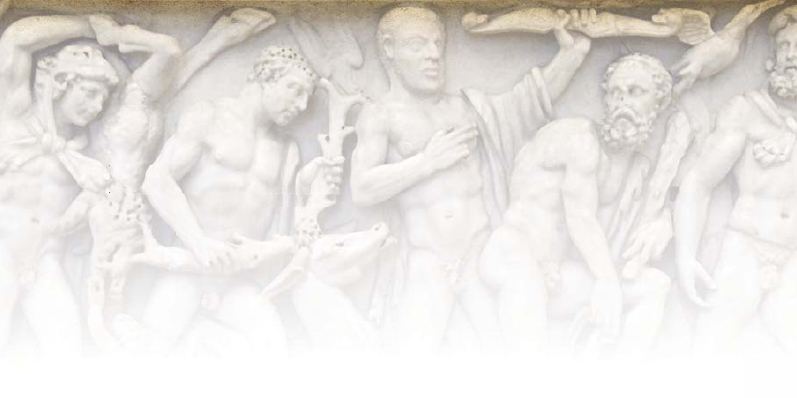

Elis was a vast kingdom in the Peloponnesus ruled by Augeias, a man of uncertain lineage. Some said he was the son of Poseidon, which would explain why he enjoyed riches as vast as the sea. By divine favor his livestock were infinitely fertile and immune from disease, so before too long his stables burst with cattle – as well as the dung they left behind. The stables had not been cleared for thirty years, and if its stench wasn’t bad enough, the refuse spilled down the hill into the fields below, which could not be tilled when they were ankle-deep with enormous turds.
The situation had gotten so out of hand and Augeias so desperate that when Hercules arrived from Mycenae with orders to clean out the stables, he promised to give the son of Zeus one tenth of his herd if he could complete the task in a single day. Hercules and Augeias had served together on the Argo, so the hero took the king at his word.

A bronze statue of Hercules as the epitome of manhood, from second century Rome. (PD-US)
Thus inspired, he climbed to the valley where the rivers Alpheus and Peneus ran, and with his bare hands punched channels from each bank into a single canal that flowed into a breach he had made in the wall of the stables. The deluge rushed through and carried the mountain of dung to the sea. The flood caused a terrifying commotion, and perhaps a cow or sheep or farmer or child or two were lost as well, but Augeias’s stables were dripping clean in a matter of seconds, much less a single day.
Nevertheless, Augeias was furious, his temper no doubt inflamed by the sudden violence with which Hercules completed his task. He refused to uphold his end of the bargain, claiming the credit should go to the rivers and their gods for the task, not Hercules himself. Hercules demanded satisfaction and called on a panel of judges to decide the case, but when Augeias’s own son Phyleus took the son of Zeus’s side the King of Elis could contain his anger no longer and banished both from his realm, never to return.
To add insult to injury, when Hercules returned to Mycenae he discovered that Eurystheus also refused to count this Labor against his total because he had entered into a side bargain with a third party. There were supposed to be ten Labors, so Hercules should have been halfway done; but since the king only counted three as successfully completed, he still had seven left to go.
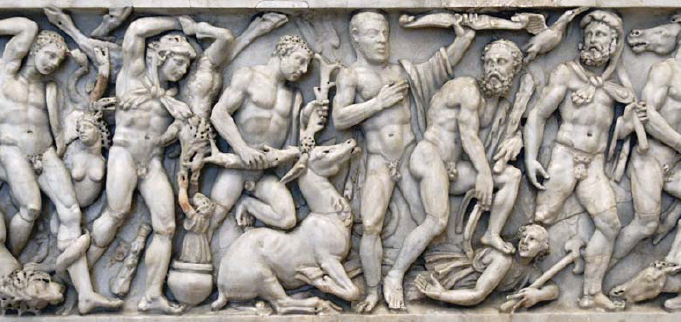
A relief sculpture from the side of a Roman sarcophagus depicting the twelve labours of Hercules (PD-US)
Eurystheus’s next task for Hercules cleverly combined two themes of previous Labors into one: placing the hero in jeopardy both from deadly monsters and from the wrath of angry gods.
Incurring the fury of Ares, the feared God of War, was a much surer thing than the king’s attempt to anger Artemis. For one thing, as the son of Hera, he had a natural reason to despise his mother’s nemesis. For another, he was one of the few gods with competition for his particular sphere of influence. Infrequently worshipped for embodying the blood-caked savagery of battle, Ares was greatly overshadowed by his half-sister Athena, goddess of the more noble aspects of war such as tactics and strategy. Athena loved Hercules as a hero of heroes, so a strike against him would be a strike against Ares’ hated rival.
For reasons as hazy as the fog of war, Ares had unleashed upon the world monstrous man-eating birds with armored feathers and bronze beaks. They migrated to Lake Stymphalia, in Arcadia, where they feasted on hapless travelers and befouled the waters with their dung.
Hercules arrived at the marshes on the farthest shore to drive the birds away with his lethal arrows, but there were simply too many of them. The situation seemed helpless until Athena came to his rescue. Relishing the opportunity to thwart her rival, the Goddess of Wisdom gave her half-brother a pair of bronze castanets (some say a rattle). With this he was able to make such a terrible cacophony that even man-eating birds were startled into flight. He killed as many as he could with his bow; the others fled to the Isle of Ares in the Black Sea, where Jason and his Argonauts finished them off.
Nonetheless, one of Eurystheus’s aims had been achieved; Ares would nurse a grudge for this insult from Hercules, and would discover the means to avenge himself soon enough.

Hercules and the Stymphalian Birds by Albrecht Durer, 1600. (Getty)
Hercules would have been well familiar with Crete’s history with bulls; it was his dear friend Theseus who had navigated her labyrinth and slain her Minotaur. That monster’s sire was an enormous snow-white bull that Poseidon sent to King Minos as a sign of favor for his rule. Minos was supposed to sacrifice the beast to the sea god but the creature’s beauty persuaded him to keep it as the primary attraction of his royal menagerie.
The gods do not take kindly to such selfishness. To punish Minos, Aphrodite made his wife, Pasiphaë, fall madly in love with the bull; nine months after this romance was consummated, a baby Minotaur was born. The horrified Minos imprisoned this aberration in a subterranean maze.
But the snow-white bull remained and was driven into a rage by the death of its son at Theseus’s hands, rampaging from one end to the other of the island nation, kicking down walls, trampling crops, and goring innocents. It belched fire at anyone who ventured near it and, besides, as it was sacred to Poseidon, killing it in a non-sacrificial fashion would be a grave sin.
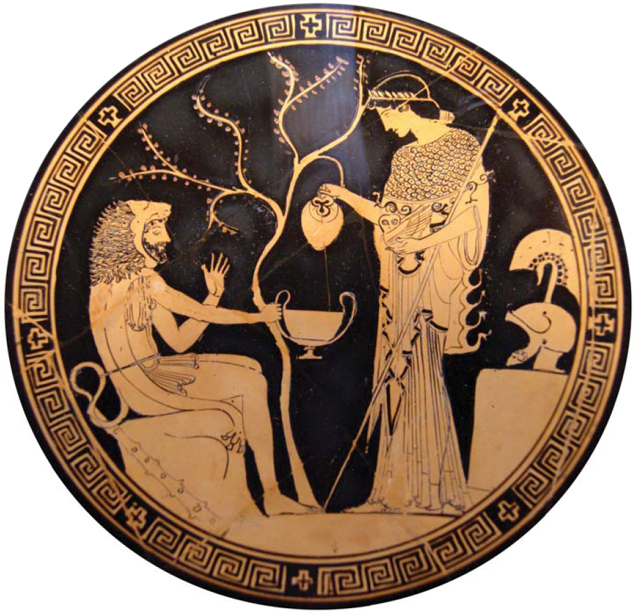
Heracles and Athena on a vase from the 5th Century, BC. (PD-US)
Minos appealed to his ally Eurystheus. Needing extra Labors anyway, since he refused to count two towards Hercules’ total, the King of Mycenae sent his superhuman slave to subdue the raging beast. Fortunately, as bulls were sacred to his father, Zeus, Hercules was skilled at bull-leaping, a sport peculiar to an ancient form of worship, particularly in Crete; athletes leapt over the animal using its horns for a grip, like the handles on a modern gymnastics pommel horse.
Hercules was able to vault onto the bull in this fashion and wrestled it into submission. He dragged it all the way to the gates of Argos, where the usually timorous Eurystheus was inspired to rededicate it to his patroness, Hera. But the Queen of Olympus refused to accept any token of esteem brought to her by hated Hercules, so she freed the bull before it could be sacrificed. The albino brute then terrorized mainland Greece until none other than Theseus himself subdued it for a second time and brought it to Athens, where it was at last sacrificed, now to the city’s – and Hercules’ – patron goddess, Athena.
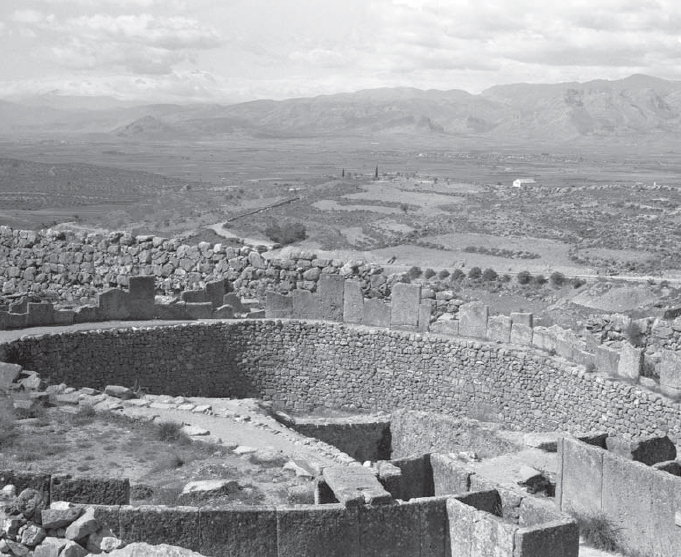
The Plain of Argos, Mycenae. Eurystheus’s guards could see Hercules returning from any of his Twelve Labors from quite a distance atop his palace walls, and warn their master what monsters, living or dead, the son of Zeus carried with him. (Corbis)
Thrace, a land below the Balkans in what is now mostly Bulgaria, though bordering also on Greece and Turkey, was oft described by the ancients as “warlike.” Indeed, the Greeks said Ares lived there and the whole region was named after the war-god’s son, Thrax. The most warlike of the Thracians was a tribe called the Bistones, who lived between the lake of the same name and the Aegean Sea. And the most warlike Bistone was their king, Diomedes – not to be confused with the later hero of the Trojan War – who kept as his personal mounts four raging she-horses fed on human flesh. Eurystheus ordered Hercules to bring him those mares.
Hercules set sail across the Aegean with a few companions and docked along the way to spend the night in the palace of his friend, the former Argonaut, King Admetus of Thessaly. Admetus greeted the hero in a funeral robes and with red eyes; taken aback, Hercules said he could come back at another time, but such was the value placed on hospitality among the Thessalonians that the king would hear none of it.
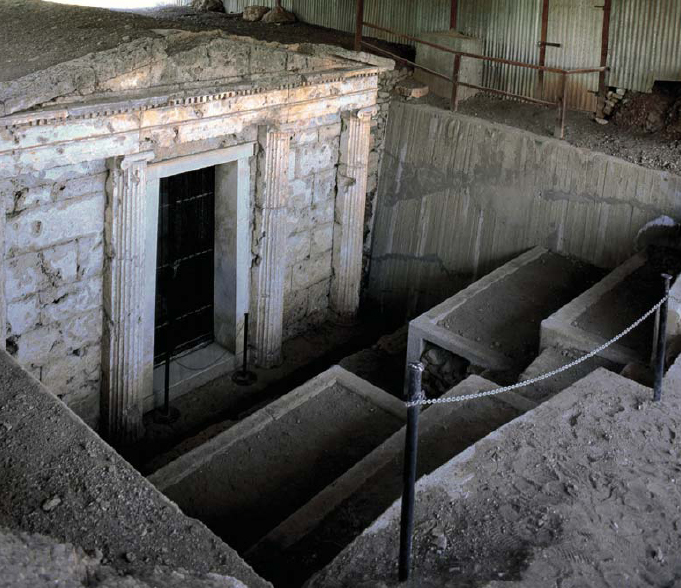
An ancient tomb in central Macedonia. Euripides’s tragedy Alcestis tells the story of Hercules entering the mausoleum of the eponymous queen to wrestle her back from Death. (Getty)
“Who has died?” Hercules asked.
“None of my blood relations,” the grieving king said, after a pause.
Admetus installed Hercules in a room far from the dirges and weeping of the funeral itself, and sent servants over with food and drink. Not long after Admetus excused himself to attend the rites, Hercules became good and drunk, singing off-color songs and inviting the slaves to join him.
One of the braver servants chastised him, provoking the son of Zeus’s infamous wrath, but before he caved in the offending slave’s head with a fist, he demanded to know the name of the recently deceased.
“Queen Alcestis,” the man stammered, “King Admetus’s wife!”
Hercules sobered instantly, and soon the whole story came out. For his service to the god Apollo, the King of Thessaly had received a rare gift. The Fates were soon to clip his thread of life, but he would be spared if he could find another to take his place. The terrified king went from servant to subject to relation to convince someone to give up their life for his; he greatly overestimated his popularity, for he found no takers. Moments from the predestined time, however, his loyal wife volunteered to sacrifice herself. The prophecy was filled, the woman’s life-line was snipped, and Admetus was beside himself in grief and guilt.
The best-known cinematic Hercules, Steve Reeves, only played the Greek hero in two Italian movies, Le fatiche di Ercole (Hercules, 1958) and Ercole e la regina di Lidia (“Hercules and the Queen of Lydia,” released in the USA as Hercules Unchained, 1959) but, in view of his Montana good-looks, action-figure pectoral muscles, and testosterone-fueled emoting, it’s not surprising he left such an indelible impression on the role. The movies themselves are lavish productions given their budget constraints, goofy fun mishmashes of the myths themselves – Hercules cribs large portions of the Argonauts story, and Unchained is a motley Frankenstein of Seven Against Thebes by Aeschylus, Oedipus at Colonus by Sophocles and (as its Italian title implies) tales of Hercules’ enslavement to Queen Omphale. Though the films catapulted Reeves to European stardom, he didn’t want to be stuck in the role, and turned down a part in a Spaghetti Western in order to leave Italy. Clint Eastwood took the part of The Man with No Name in A Fistful of Dollars in Reeves’s stead, so perhaps he acted a little hastily there.
Reeves had been a bodybuilder since high school, and a beefcake physique was thought de rigueur for the role of Hercules. We have the son of Zeus to thank (or blame) for providing Arnold Schwarzenegger with his first starring role in the low-budget stinker Hercules in New York (1969). Just 22 at the time, the future governor of California had not yet gotten his famous Austrian accent under control and all his lines in the film had to be redubbed. (Fittingly, he was credited as “Arnold Strong.”)
Although he was the subject of a string of barely watchable grade-Z live-action films, the most commercially successful cinematic Hercules is the Walt Disney Company’s animated version in 1997. Unsurprisingly, the family-friendly feature pares away many of the more unsavory aspects of the hero’s myths, and as a consequence usual villain Hera is passed over in favor of James Woods’s star turn as Hades.
The main thing the cartoon gets right is Hercules’ prophesied role as savior during an apocalyptic battle between the gods and their enemies – here the imprisoned Titans rather than the giants. Hades hopes to wrest the throne from Zeus in the coming war, so, in a curious reversal of myth, he administers a potion that turns the baby Hercules – in the Disney film, a god born on Mount Olympus – into a mortal. His imps Pain & Panic abandon Hercules on Earth, where he is brought up by mortal farmers. Disney thus transforms the Hercules myth from Jesus Christ (god born on Earth to save mankind) to Superman (god sent to Earth to save mankind ... complete with cape!). Then, taking a page from X-Men, teenage Hercules is persecuted as a freak for his immense strength and has to have a proper modern Hollywood journey of self-discovery before defeating the Lord of the Underworld and his schemes.
As a Disney animated musical Hercules isn’t terrible, but for someone with any knowledge of the myths behind the hero, it’s a curious artifact. (And the songs are pretty weak.) For those craving mythological verisimilitude, however, one need look no further than the greatest in the sword-and-sandal cycle inspired by the success of the Reeves films, Jason and the Argonauts (1963). Probably the best movie ever made from the Greek myths, with justly lauded Ray Harryhausen special effects that still hold up today and a great score by legendary film composer Bernard Hermann, Jason has a Hercules played by middle-aged, lithe (but not particularly muscular) South African/British actor Nigel Green. Boastful and arrogant, fun-loving and loyal to the death to his friends, Green’s Hercules endangers the crew of Argo when he ignores a warning from the gods and awakens the bronze Titan Telos by looting a temple that the statue guards. Though clever Jason saves the crew, Hercules refuses to rejoin the voyage, and instead remains behind to locate his friend, Hylas. The audience knows, but Hercules does not, that Hylas was killed in the battle, and the last image of the aging hero is Hercules wandering the barren island, calling his dead friend’s name. Tragedy mixed with heroism, envy with pity: these are the traits that have defined Hercules from the earliest myths to today.
The son of Zeus was no less ashamed for having behaved so abominably in a house wracked with such keen sorrow. He insisted to his friend that Alcestis was not so long dead that she could not be rescued. Over the protests of his hosts he ventured down into the cemetery and found Death, Thanatos himself, bent over the hapless lady’s bier inside her tomb. Hercules assaulted the son of Night and Darkness, lethal twin to Sleep, and wrestled him to the ground until he swore to free Queen Alcestis from his clutches. Thanatos had no choice but to fly away on his raven’s wings in defeat. Hercules carried the newly revived woman back to the arms of her grateful husband.
“There is no other story about Hercules which shows so clearly his character as the Greeks saw it,” concludes no less than an authority than the beloved classicist Edith Hamilton. “His simplicity and blundering stupidity; his inability not to get roaring drunk in a house where someone was dead; his quick penitence and desire to make amends at no matter what cost; his perfect confidence that not even Death was his match. That is the portrait of Hercules.”
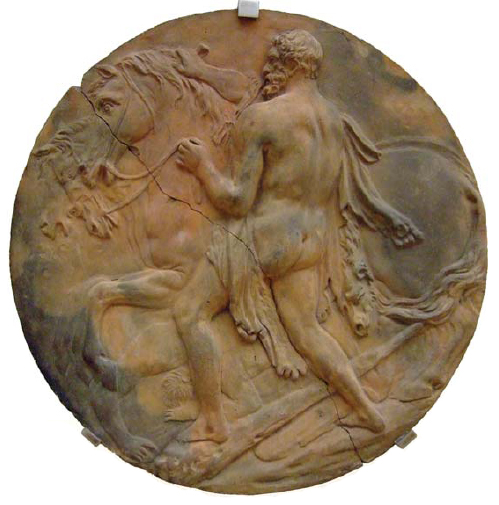
Hercules and the Mares of Diomedes, terracotta relief by Johann Gottfried Schadow, ca. 1790 (PD-US)
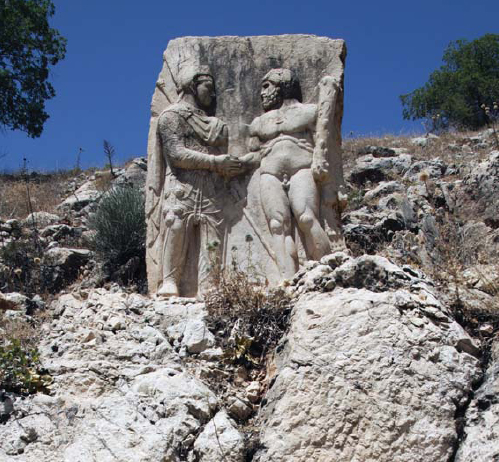
In a scene that could have come from a modern political campaign, King Mithridates of Commagene shakes Hercules’ hand in the ruins of Arsameia in what is now Turkey. Leaders as recent as Mussolini have invoked the legendary hero’s name to claim he approves of their rule. (PD-US)
This epitomizing act of heroism complete, Hercules returned to the task before him. The voyage to Thrace completed, he stole into the Bistones’ snow-cloaked encampment in the dark of a moonless night. Diomedes tethered his gore-caked mares to bronze mangers with iron chains, which the hero easily shattered with his great strength. The horses’ names were The Fast, The Shining, The Blonde, and The Terrible – though any of the four were apt descriptions – and they rewarded Hercules for their freedom by running away from him at a thunderous gallop that awoke the Bistones from their pallets of fur. Hercules dashed after the mares with the spear-waving hordes of Diomedes giving chase right behind him, bellowing in rage.
Thinking as fast as he could, Hercules punched through the nearest sea wall and flooded the upper part of the peninsula they were on, cutting it off from the mainland and turning it into an island. This accomplished the dual goals of flooding the mares’ escape route and diverting them toward the coast. It also prevented his pursuers from having anywhere to go when he attacked them. He then whirled and confronted the trapped Bistones, dispatching many with his club. He knocked the king senseless and dragged Diomedes back to his ship as a hostage. To his horror, he discovered the horses had devoured many of his companions, so to fully glut their bellies he fed them their master as well. Hercules was then able to muzzle the horses, drowsy from their feast, for the voyage back to Argos.

One of the many, many temples dedicated to Hercules around the world: This one is in Amman, Jordan. (Diego Delso)
The Amazons were among the most feared warriors of the Age of Myth, despite being, or perhaps because they were, an all-female society. Their name means “breastless,” and though the story circulated that they had one or both breasts removed to improve their archery skills, all ancient art depicts them with the full complement of two. This would only stand to reason; female archers have drawn back bowstrings for centuries without their bosoms getting in the way.
Maybe the term “breastless” was meant to be metaphorical, for Amazons displayed few of what are traditionally thought of as feminine or maternal virtues. Merciless in war, they held the opposite sex in utter contempt. Whenever they felt the need to increase their number they would raid nearby tribes for men to rape. Once impregnated, the Amazons would murder their involuntary suitors and drown any male newborns that resulted, keeping their single-sex society free of the taint of masculinity. Indeed, Herodotus tells us that the Scythian word for Amazon meant “Killers of Men.”
Their queen was Hippolyta, the daughter of Ares and a mortal woman, and the war-god had given his daughter a “girdle” – more like a waist-belt or a sash when compared with our modern versions – to signify her divine lineage and proof of her worthiness to rule. Eurystheus wanted to give the sash as a gift to his own spoiled daughter, Admeta, and bade Hercules to fetch it for him.
Few would have argued that this was the most challenging task yet set before the son of Zeus, and for the most frivolous of reasons.
Hercules assembled a crew of heroes, including his shield-bearer Iolaus and his friend Theseus of Athens. They set sail for the Amazonian capital of Themiscyra at the mouth of the River Thermodon where it flows into the Black Sea, in what is now Turkey. Hippolyta spied Hercules from her palace window when he arrived and was captivated by his unparalleled physique. Anticlimactically, she descended to the harbor where his ship was anchored and willingly gave her girdle to him as a token of her affection.
Hera, watching from high Olympus, would have none of this. To Themiscyra she descended in the form of an Amazonian soldier and raised the alarm that an invading force of men was kidnapping their queen. The warrior women leapt to their mounts and charged the Mycenaean ship. Hercules instantly assumed Hippolyta had betrayed him, and murdered the Amazon queen on the spot. In his Library of History, Diodorus Siculus describes the battle that ensued:
Now the general mass of the Amazons were arrayed against the main body of the followers of Heracles, but the most honored of the women were drawn up opposite Heracles himself and put up a stubborn battle. The first, for instance, to join battle with him was Aella, who had been given this name because of her swiftness, but she found her opponent more agile than herself.
The second, Philippis, encountering a mortal blow at the very first conflict, was slain.
Then he joined battle with Prothoê, who, they said, had been victorious seven times over the opponents whom she had challenged to battle.
When she fell, the fourth whom he overcame was known as Eriboea. She had boasted that because of the manly bravery which she displayed in contests of war she had no need of anyone to help her, but she found her claim was false when she encountered her better.
The next, Celaeno, Eurybia, and Phoebê, who were companions of Artemis in the hunt and whose spears found their mark invariably, did not even graze the single target, but in that fight they were one and all cut down as they stood shoulder to shoulder with each other.
After them Deïaneira, Asteria and Marpê, and Tecmessa and Alcippê were overcome. The last-named had taken a vow to remain a maiden, and the vow she kept, but her life she could not preserve. The commander of the Amazons, Melanippê, who was also greatly admired for her manly courage, now lost her supremacy.
And Heracles, after thus killing the most renowned of the Amazons, and forcing the remaining multitude to turn in flight, cut down the greater number of them, so that the race of them was utterly exterminated.
Among the few warrior women that Hercules spared was Antiope, sister to Hippolyta, whom he gave to Theseus as a trophy as they sailed away with the queen’s girdle. She would ultimately come to love the hero and bear him a son, Hippolytus. Antiope would be killed tragically by an Amazonian arrow when what remained of her tribe attacked Athens in a misguided attempt to rescue her. Theseus would remarry Phaedra, Princess of Crete, who fell in love with her comely stepson. When Hippolytus rejected her advances, Phaedra told her husband the boy had raped her, and in his fury Theseus cursed his son, who was soon dragged to death by his own horses.
Such was the wheel of tragedy set in motion by Hera’s treachery; the extermination of the Amazon race, followed by the bitter end of the house of Theseus. Hera retreated to Olympus to brood on her failures; whether she had any regrets for the deaths she had caused we do not know, for the lives of men are little better than the lives of mayflies in the eyes of the gods.
And Eurystheus’s daughter received Hippolyta’s girdle as a plaything. We have no record of how long she wore it before she forgot she ever owned it and left it to lie collecting dust in the rear of some infrequently opened drawer.

In the most tragic of the Twelve Labors, Hera tricked the Amazons into believing Hercules was kidnapping their queen, Hippolyta. When the women warriors attacked his ship, Hercules assumed Hippolyta had betrayed him, so he slew her, then her misguided defenders.